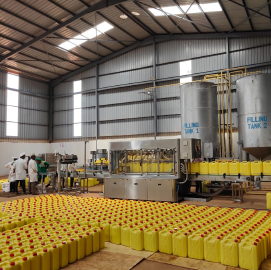ETG’s commitment towards Zero Hunger
The Zero Hunger Pledge is a commitment to eliminate hunger, ensure food security, improve nutrition, and promote sustainable agriculture, as part of the United Nations' Sustainable Development Goals by 2030.
ETG is one of 44 companies that have so far joined the Pledge, contributing to the more than half a billion-dollar commitment made towards zero hunger in 47 countries.
ETG embraced the Zero Hunger Pledge in September 2022, making a commitment to various investments, including 2 ETG Parrogate initiatives, across diverse countries globally. This demonstrates the group’s dedication to achieving food security and eradicating hunger by 2030.
ACTION TOWARDS ZERO HUNGER: MALAWI
Malawi's edible oil industry is experiencing a transformative journey towards self-sufficiency and food security, fuelled by a strategic investment and commitment to the Zero Hunger Pledge. The partnership between ETG-PARROGATE, a joint venture between ETG and Parrogate Group, is at the forefront of this endeavour, with its innovative approach to edible oil production and employment generation.

Expanding the Edible Oil Landscape
The industry manufactures three main oil categories: soybean, palm, and sunflower oils. Notably, soybean has emerged as a cornerstone cash crop, crucial to the local oil industry's raw material supply.
Soybean production has witnessed remarkable growth. The trend, spurred by the VAT exemption and increased demand for soybean, is anticipated to continue, with small-scale farmers playing an increasingly vital role.
ETG-PARROGATE's Groundbreaking Project
ETG-PARROGATE's groundbreaking project, the Solvent Extraction Plant (SEP), is a testament to their commitment to Malawi's economic growth and food security. This state-of-the-art Oil Seed Crushing Plant and Oil Refinery/Processing Facility is set to revolutionize the local edible oil landscape. The venture capitalizes on the potential of locally procured oil seeds from small-scale farmers, particularly soybean.
With a crushing capacity of 200 metric tons per day, the SEP project will produce crude soybean oil. This oil will then undergo refinement, packaging, and sale in domestic markets, contributing to reduced dependence on crude oil imports. Moreover, the by-product, soymeal, will be both sold locally and exported to neighbouring countries, further amplifying the economic impact.
Nurturing Farmers and Bridging Supply Gaps
With the support of cooperatives and farmer associations, the SEP project holds a two-fold promise: first, to provide a ready market for approximately 80,000 small-scale farmers, thereby supporting their livelihoods. Second, by using locally produced soybean for edible oil and soymeal, the entire supply chain benefits from value addition. This strategy aligns with the "Buy Malawi Strategy," addressing both food security and economic prosperity.
In addition to farmers, the project stands as a beacon of job creation. ETG-PARROGATE's investment created over 215 job opportunities, encompassing various roles, including technical positions. A significant percentage of these positions were allocated to women and young people, ensuring inclusivity and empowerment within the local workforce.
Knowledge and Skill Transfer for Sustainability
ETG PARROGATE's commitment extends beyond immediate operations. The company plans to establish training programs that promote knowledge and skill transfer among employees, ensuring that local community’s benefit from lasting expertise.
By blending technological advancements, economic growth, and community upliftment, ETG-PARROGATE's SEP project embodies the Zero Hunger Pledge's principles, underlining the potential of private sector initiatives to drive positive change in Malawi.
And then to sell edible oil on the local market affordable for people.
ACTION TOWARDS ZERO HUNGER: RWANDA

ETG's upcoming industrial venture in Rwanda represents more than just an investment; it signifies a commitment to creating a sustainable pathway toward zero hunger.
Situated in the Rwamagana District of the Eastern Province, this visionary endeavour will focus on edible oil refining and packaging. The project involves the import of specialized machinery to refine and package edible oils, contributing to Rwanda's local food production capabilities.
This venture represents a greenfield project, demonstrating ETG's dedication to building something new and impactful from the ground up. As the project is introducing a new industry to Rwanda, it symbolizes the potential for growth and transformation within the country.
By generating employment opportunities and locally adding value to the agricultural sector, ETG's project aligns with Rwanda's economic growth objectives and its aspirations to achieve food security.
Empowering Local Farmers and Workforce
The project's influence extends beyond its physical boundaries. ETG's commitment to nurturing local talent is evident in its plan to recruit 250 employees. The inclusive approach is remarkable, with around 50% of these positions targeted for women and youth. The recruitment strategy encompasses various roles, from technical and semi-skilled positions to sales, commercial, and administrative support functions.
Edible oil plays a vital role in daily life as a primary source of dietary fat and essential nutrients. It enhances the flavour of food, aids in cooking, and provides energy. Additionally, it supports the absorption of fat-soluble vitamins and promotes overall health when consumed in moderation.
We believe that the focus on these two edible oil initiatives will not only provide local communities with economies of scale but also be a vital step towards the zero hunger initiative through the creation of jobs, quality products at affordable prices, driving the local economy, and creating a positive impact for Africa.



